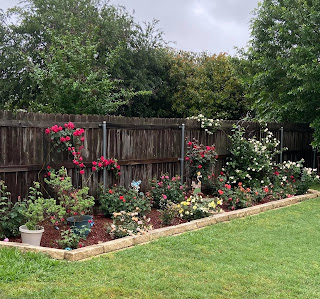Gardening is one of my favorite pastimes. I love planting new plants and watching them grow, blossom, and bloom. I love being able to eat the fresh spinach or tomatoes that we grow in my yard! I hope to have more berries, peaches, and limes next year! The whole process makes me feel happy and contented.
The CDC recommends at least 2.5 hours per week of moderate intensity level activity. Now, this does not mean just standing around with a hose and watering plants. This means weeding, digging in the dirt, hoeing, pruning, and mowing. Since many of us have jobs that involve sitting for hours on end, getting up and working in the garden can be good for us physically and emotionally.
So What Are Some of the Benefits of Gardening?
- Reduced levels of Cortisol. Cortisol is the stress hormone. A study in the Netherlands showed decreased levels of cortisol in the blood stream after just 30 minutes of gardening. Reducing cortisol can influence mood, immune function , obesity, memory, learning problems, and heart disease, decrease stress and improve self esteem. Stress can increase irritability, headaches, stomach aches, and worsen pre-exisiting conditions. There is a real feeling of satisfaction when you look out and see a beautiful garden that you've cared for.
- Decreased risk for heart attack and stroke. Moderate intensity exercise can cut the risk of stroke and heart attack by 30% for people over 60, according to a study in Stockholm. Just 10 minutes a day outside without sunscreen is enough to increase your Vitamin D levels and decrease the risk of heart disease, osteoporosis, colon cancer, high blood pressure, and type 2 diabetes. And exercise is the best way to help you lose weight and prevent the health dangers associated with obesity., including joint pain and arthritis. Many gardeners may actually do more exercise than 2.5 hours per week because they are enjoying it. Gardening can provide aerobic benefits as well as stretching and strengthening in both arms and legs.
- Increased Hand Strength and Dexterity. As a physical therapist in skilled nursing facilities, I frequently see the residents having problems using their hands as they age. Gardening can keep the hand muscles strong, and increase their endurance. You can also alternate use of the right and left hand to keep the brain adaptable. Be sure not to overdo it to avoid repetitive motion injuries, like tendonitis and carpal tunnel syndrome.
- Decrease the Risk for Alzheimer's Disease and Other Dementias. Studies have shown a decrease in the risk of dementia by at least 36%. Activities that involve strength, endurance, dexterity, learning, and problem solving are great to keep the mind and body active and healthy. Gardening also brings pleasant sensory stimulation and pride. Many facilities caring for the elderly, and particularly those with dementia, are using gardening as part of their treatment approach.
- Regulation of Immune System. Vitamin D has been shown to be helpful in immune disorders and can help with decreasing the risk of heart disease. A friendly bacteria found in the dirt, called Mycobacterium vaccae, can be helpful in alleviating symptoms of immune disorders such as psoriasis, allergies, asthma. It can be absorbed by inhalation, ingestion of the vegetables, and through the dirt on your skin. Children who were allowed to play in the dirt later had better immune systems than those whose parents washed every speck of dirt off.
- Reduced levels of Cortisol. Cortisol is the stress hormone. A study in the Netherlands showed decreased levels of cortisol in the blood stream after just 30 minutes of gardening. Reducing cortisol can influence mood, immune function , obesity, memory, learning problems, and heart disease, decrease stress and improve self esteem. Stress can increase irritability, headaches, stomach aches, and worsen pre-exisiting conditions. There is a real feeling of satisfaction when you look out and see a beautiful garden that you've cared for.
- Increased Hand Strength and Dexterity. As a physical therapist in skilled nursing facilities, I frequently see the residents having problems using their hands as they age. Gardening can keep the hand muscles strong, and increase their endurance. You can also alternate use of the right and left hand to keep the brain adaptable. Be sure not to overdo it to avoid repetitive motion injuries, like tendonitis and carpal tunnel syndrome.
- Decrease the Risk for Alzheimer's Disease and Other Dementias. Studies have shown a decrease in the risk of dementia by at least 36%. Activities that involve strength, endurance, dexterity, learning, and problem solving are great to keep the mind and body active and healthy. Gardening also brings pleasant sensory stimulation and pride. Many facilities caring for the elderly, and particularly those with dementia, are using gardening as part of their treatment approach.
- Regulation of Immune System. Vitamin D has been shown to be helpful in immune disorders and can help with decreasing the risk of heart disease. A friendly bacteria found in the dirt, called Mycobacterium vaccae, can be helpful in alleviating symptoms of immune disorders such as psoriasis, allergies, asthma. It can be absorbed by inhalation, ingestion of the vegetables, and through the dirt on your skin. Children who were allowed to play in the dirt later had better immune systems than those whose parents washed every speck of dirt off.
A 10% increase in green space has been known to decrease a person's health complaints equivalent to a decrease in 5 years of age, as well as increase property values in your neighborhood.
Try gardening yourself and see what happens. It's easy if you have a yard, but even apartment dwellers can try it on a balcony or patio. You'll be surprised at the results!

No comments:
Post a Comment